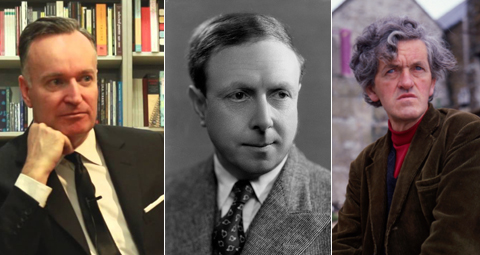May 19 | ![]() 0 COMMENTS
0 COMMENTS ![]() print
print

A rich history of stirring stories
LINDEN Bicket looks back at the critically neglected tradition of Scottish Catholic writing
LAST winter, Martin Scorsese’s masterful historical epic Silence brought Shūsaku Endō’s 1966 novel of the same name to the big screen. This mesmerising drama follows the mission of two 17th-century Jesuit priests from Portugal to Japan, where they search for their missing mentor under threat of execution by the violently anti-Christian Tokugawa shogunate. Mr Scorsese’s film has introduced a whole new generation to the power of the Catholic imagination to create gripping tales of sin, sex, and salvation. Especially striking is this film’s (and the original novel’s) depiction of underground Christianity in the ‘mudwamp’ of Japan.
Alongside the morally ambiguous settings used by Graham Greene in his novels, and the ‘Christ-haunted’ American South of Flannery O’Connor, Silence provides us with a glimpse into yet another Catholic writer’s imaginative terrain.
But though names such as Greene, O’Connor, Evelyn Waugh—and now Endō—may be familiar to us as writers of the Catholic imagination, we rarely hear of Scottish Catholic authors. Why is this?
Perhaps this is partially due to the Scottish literary-critical tradition over the last century—one created largely by critics who were themselves poets and novelists.
A leading figure in Scottish literary criticism, the poet and critic Edwin Muir (1887-1959), declared that Scottish Calvinism produced ‘the captivity of the imagination in Scotland’ until the 18th century. Mr Muir’s contemporary, the poet Hugh MacDiarmid (1892-1978), lamented the ‘peculiarly unfortunate form the Reformation took in Scotland.’
Scotland’s particularly dark and savage Reformation irreparably damaged the nation, argued Mr Muir and Mr MacDiarmid, leaving it sternly resistant to artistic production. Ironically, though they were bitter enemies in life, Mr Muir and Mr MacDiarmid were strikingly of one mind when it came to diagnosing Scotland’s supposedly thwarted artistic tradition, where the creative impulse felt in Catholic art before the Reformation was destroyed by John Knox and other (rather sinister-sounding) reformers.
This diagnosis of a damaged national culture has many flaws—we only need to look at the host of writers Scotland has produced whose fantastically vital work is imbued with Protestant spirituality. But the Muir-MacDiarmid theory has been tremendously influential, and our dour national character is referenced again and again by contemporary Scottish artists, critics, and writers, including James MacMillan and Andrew O’Hagan, whose work is undoubtedly shaped by their own Catholic formation.
In fact, Scotland has a rich history of Catholic writing and poetry, but this history has been submerged by the prevailing idea that the Scottish author is haunted, and inhibited, by the legacy of the Reformation.
Take Patrick McGill (1890-1963), the ‘navvy poet’ of Donegal, for instance. After leaving Ireland and working in the potato fields of Ayrshire and the Caledonian railway in Kinlochleven, Mr McGill went on to achieve huge transatlantic success with his novels of urban poverty, injustice, and socialism in Glasgow.
His first novel, Children of the Dead End (1914), dramatised Mr McGill’s own experience of nomadic labour in Kinlochleven, and sold 10,000 copies in a fortnight in Britain and the USA, outstripping sales of Joyce’s Dubliners that year (Mr Joyce sold only 499 copies, and bought 120 of these himself).
But Scotland’s history of Catholic writing is not simply Irish-centred. Many of Scotland’s Catholic authors over the last century have been converts. The fiery zealot Fionn Mac Colla (real name Thomas MacDonald, 1906-1975) was raised in a Plymouth Brethren family in Montrose.
He converted to Catholicism in 1935. Mr MacDonald zealously promoted Scottish Gaelic language and culture, Scottish nationalism, and a return to Scotland’s ancient Catholic Faith. His novels The Albannach (1932) and And the Cock Crew (1935)—unjustly neglected works of real power and passion—express his fury over the Highland Clearances.
There were many other Scottish converts to Rome, who wrote novels and histories of Scotland from a Catholic—and often nationalist—perspective. But not all Scotland’s literary converts were concerned primarily with politics.
It is often forgotten that Muriel Spark (1918-2006) was a Scottish writer, so cosmopolitan and international in focus is her fiction. Mrs Spark’s writing exploits a fascinating exchange between Catholic and Protestant theology, and her best-known work, the chilling short novel The Prime of Miss Jean Brodie (1961) illustrates that these two Christian traditions need not be seen as antithetical.
Mrs Spark’s contemporary, and by now the most famous of Scottish convert writers, George Mackay Brown (1921-1996), is quite different again to the cosmopolitan Mrs Spark.
In his work, Mr Brown weaves historical tapestries of ‘the small green world of Orkney,’ yet his literary universe is no less poignant and impressive for its local focus. And of course, Scotland has produced its cradle of Catholic authors. In his day, AJ Cronin (1896-1981) achieved tremendous success but he is now largely forgotten. An alumnus of both St Aloysius College in Glasgow and the University of Glasgow (where he studied medicine), Mr Cronin was the author of the Dr Finlay stories, which became the hugely popular, long-running BBC radio and television series Dr Finlay’s Casebook.
The Catholicism of the Dr Finlay stories was written out of the television series, but in his novels, Mr Cronin often explores themes of Faith, conscience and morality.
His novel, The Keys of the Kingdom (1942), was filmed in Hollywood in 1944, starring Gregory Peck. This book tells of the struggle of a Catholic priest to establish a mission in China. The Keys of the Kingdom ends with a plea for Christian tolerance and open-mindedness which is as needed now as it was in the 1940s.
This is just a glimpse into the riches of Scottish Catholic fiction. Many other writers, including George Scott-Moncrieff, Bruce Marshall, and George Friel, have brought the Scottish Catholic experience to life.
And this work is still being created, though we tend not to think of Anne Donovan, John Burnside and Andrew O’Hagan as Scottish Catholic writers.
With such a thriving yet critically neglected tradition, now is the time for Scotland’s Catholic fiction to be silenced no more, and read and discussed much more widely.
Linden Bicket’s new study, George Mackay Brown and the Scottish Catholic Imagination, will be published by Edinburgh University Press this summer











